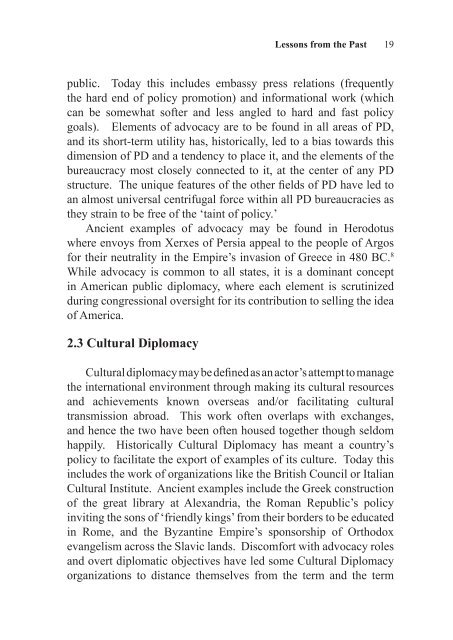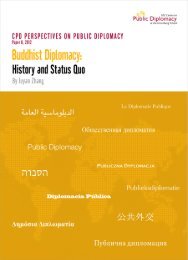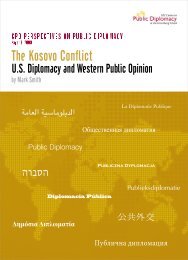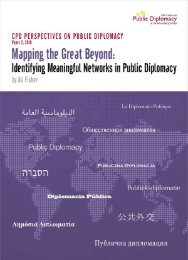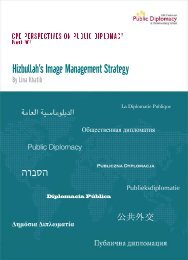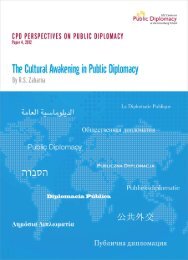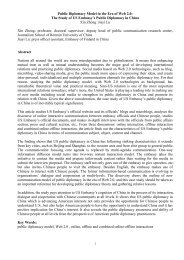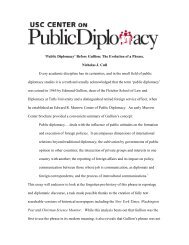Lessons from the Past - USC Center on Public Diplomacy
Lessons from the Past - USC Center on Public Diplomacy
Lessons from the Past - USC Center on Public Diplomacy
You also want an ePaper? Increase the reach of your titles
YUMPU automatically turns print PDFs into web optimized ePapers that Google loves.
<str<strong>on</strong>g>Less<strong>on</strong>s</str<strong>on</strong>g> <str<strong>on</strong>g>from</str<strong>on</strong>g> <str<strong>on</strong>g>the</str<strong>on</strong>g> <str<strong>on</strong>g>Past</str<strong>on</strong>g> 19<br />
public. Today this includes embassy press relati<strong>on</strong>s (frequently<br />
<str<strong>on</strong>g>the</str<strong>on</strong>g> hard end of policy promoti<strong>on</strong>) and informati<strong>on</strong>al work (which<br />
can be somewhat softer and less angled to hard and fast policy<br />
goals). Elements of advocacy are to be found in all areas of PD,<br />
and its short-term utility has, historically, led to a bias towards this<br />
dimensi<strong>on</strong> of PD and a tendency to place it, and <str<strong>on</strong>g>the</str<strong>on</strong>g> elements of <str<strong>on</strong>g>the</str<strong>on</strong>g><br />
bureaucracy most closely c<strong>on</strong>nected to it, at <str<strong>on</strong>g>the</str<strong>on</strong>g> center of any PD<br />
structure. The unique features of <str<strong>on</strong>g>the</str<strong>on</strong>g> o<str<strong>on</strong>g>the</str<strong>on</strong>g>r fields of PD have led to<br />
an almost universal centrifugal force within all PD bureaucracies as<br />
<str<strong>on</strong>g>the</str<strong>on</strong>g>y strain to be free of <str<strong>on</strong>g>the</str<strong>on</strong>g> ‘taint of policy.’<br />
Ancient examples of advocacy may be found in Herodotus<br />
where envoys <str<strong>on</strong>g>from</str<strong>on</strong>g> Xerxes of Persia appeal to <str<strong>on</strong>g>the</str<strong>on</strong>g> people of Argos<br />
for <str<strong>on</strong>g>the</str<strong>on</strong>g>ir neutrality in <str<strong>on</strong>g>the</str<strong>on</strong>g> Empire’s invasi<strong>on</strong> of Greece in 480 BC. 8<br />
While advocacy is comm<strong>on</strong> to all states, it is a dominant c<strong>on</strong>cept<br />
in American public diplomacy, where each element is scrutinized<br />
during c<strong>on</strong>gressi<strong>on</strong>al oversight for its c<strong>on</strong>tributi<strong>on</strong> to selling <str<strong>on</strong>g>the</str<strong>on</strong>g> idea<br />
of America.<br />
2.3 Cultural <strong>Diplomacy</strong><br />
Cultural diplomacy may be defined as an actor’s attempt to manage<br />
<str<strong>on</strong>g>the</str<strong>on</strong>g> internati<strong>on</strong>al envir<strong>on</strong>ment through making its cultural resources<br />
and achievements known overseas and/or facilitating cultural<br />
transmissi<strong>on</strong> abroad. This work often overlaps with exchanges,<br />
and hence <str<strong>on</strong>g>the</str<strong>on</strong>g> two have been often housed toge<str<strong>on</strong>g>the</str<strong>on</strong>g>r though seldom<br />
happily. Historically Cultural <strong>Diplomacy</strong> has meant a country’s<br />
policy to facilitate <str<strong>on</strong>g>the</str<strong>on</strong>g> export of examples of its culture. Today this<br />
includes <str<strong>on</strong>g>the</str<strong>on</strong>g> work of organizati<strong>on</strong>s like <str<strong>on</strong>g>the</str<strong>on</strong>g> British Council or Italian<br />
Cultural Institute. Ancient examples include <str<strong>on</strong>g>the</str<strong>on</strong>g> Greek c<strong>on</strong>structi<strong>on</strong><br />
of <str<strong>on</strong>g>the</str<strong>on</strong>g> great library at Alexandria, <str<strong>on</strong>g>the</str<strong>on</strong>g> Roman Republic’s policy<br />
inviting <str<strong>on</strong>g>the</str<strong>on</strong>g> s<strong>on</strong>s of ‘friendly kings’ <str<strong>on</strong>g>from</str<strong>on</strong>g> <str<strong>on</strong>g>the</str<strong>on</strong>g>ir borders to be educated<br />
in Rome, and <str<strong>on</strong>g>the</str<strong>on</strong>g> Byzantine Empire’s sp<strong>on</strong>sorship of Orthodox<br />
evangelism across <str<strong>on</strong>g>the</str<strong>on</strong>g> Slavic lands. Discomfort with advocacy roles<br />
and overt diplomatic objectives have led some Cultural <strong>Diplomacy</strong><br />
organizati<strong>on</strong>s to distance <str<strong>on</strong>g>the</str<strong>on</strong>g>mselves <str<strong>on</strong>g>from</str<strong>on</strong>g> <str<strong>on</strong>g>the</str<strong>on</strong>g> term and <str<strong>on</strong>g>the</str<strong>on</strong>g> term


